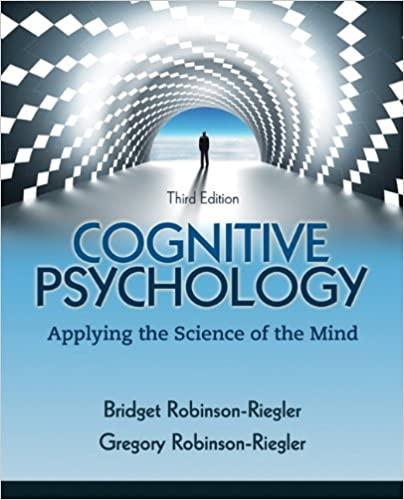Question
can I get some feedback on this topic? Exploring the Psychological Impact of COVID-19 and Adaptation Strategies in Different Populations Introduction The global landscape has
can I get some feedback on this topic?
Exploring the Psychological Impact of COVID-19 and Adaptation Strategies in Different Populations
Introduction
The global landscape has undergone profound transformations in recent years, marked by a series of impactful events, including the COVID-19 pandemic. These events have not only reshaped the physical world but have also left a mark on the psychological fabric of societies worldwide. This report explores global events' intricate and multifaceted psychological consequences, focusing on their effects on diverse populations. The aim is to unravel the complex interplay of human behavior, cognition, and well-being in response to the challenges posed by the pandemic. By exploring the psychological ramifications, we seek to contribute to a deeper understanding of how different populations adapt and cope in the face of adversity. In the following pages, we will explore the prevailing literature, offering a view of what researchers have already discovered about the psychological impact of global events on different populations. We will explore the unique challenges faced by neurodivergent communities, such as individuals with autism spectrum disorder, ADHD, and anxiety disorders, as they adapt to the disruptions brought about by events like the COVID-19 pandemic. The research aims to connect understanding with actionable solutions. By analyzing the current knowledge of the psychological effects of global events, our goal is to inform the creation of effective policies and support structures.
Hurwitz et al. (2022) explored how educators and specialists restructured their methods to accommodate students with ASD during the pandemic. The study was anchored in examining changes to Individualized Education Programs (IEPs) and implementing evidence-based practices across 40 school districts. Such an investigation becomes crucial as it not only highlights the unique challenges faced by the neurodivergent communities but also foregrounds the strategies educators employ to bridge the gaps in a rapidly changing educational environment. Meanwhile, to gain a more holistic understanding of the pandemic's effects, it becomes imperative to consider the educational adaptations and social implications. Amirova et al. (2022) ventured into this territory by examining the impact of the COVID-19 lockdown on children with ASD, primarily in Kazakhstan. The study unveiled significant disruptions in learning, social interactions, and regular activities, which are vital facets of the daily lives of these children. Such a lens allows for a comprehensive understanding of the myriad challenges faced by the ASD population during this global crisis. In tandem with the specific challenges faced by the ASD community, the broader education sphere saw a paradigm shift in instructional methodologies. Septantiningtyas et al. (2021) scrutinized the efficacy of the Google Meets application in piquing student interest, specifically in university settings. The study presented compelling evidence of the comparative advantages of face-to-face instruction over online platforms. On a similar note, Andriani et al. (2022) delved into the world of online math learning. The investigation centered on the effectiveness of the GeoGebra-based Flipped Learning model in nurturing critical thinking skills among students. Their findings underpin the argument that when employed effectively, specific strategies can foster better outcomes even in a virtual environment.
These studies collectively present a detailed overview of the challenges and adjustments during the pandemic. From the nuanced needs of the ASD community to the broader shifts in instructional methodologies, the literature provides a comprehensive backdrop against which the present study is situated. Building on this foundation, the current research aims to further unravel the layers of adaptations across varied populations during the pandemic. By doing so, it seeks to add depth to the discourse and offer insights that can pave the way for more resilient and inclusive educational strategies in the face of future global challenges.
Step by Step Solution
There are 3 Steps involved in it
Step: 1

Get Instant Access to Expert-Tailored Solutions
See step-by-step solutions with expert insights and AI powered tools for academic success
Step: 2

Step: 3

Ace Your Homework with AI
Get the answers you need in no time with our AI-driven, step-by-step assistance
Get Started


